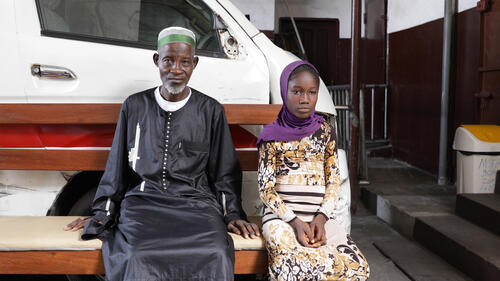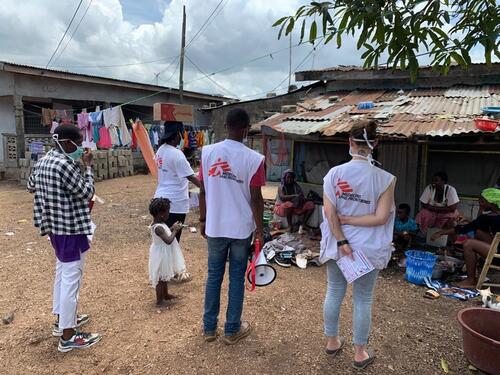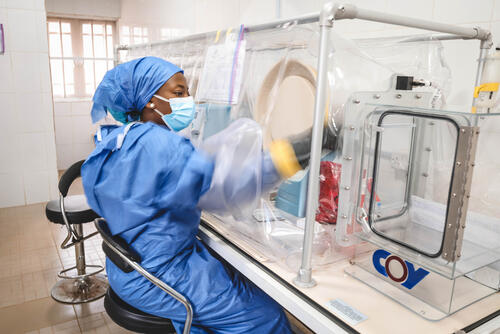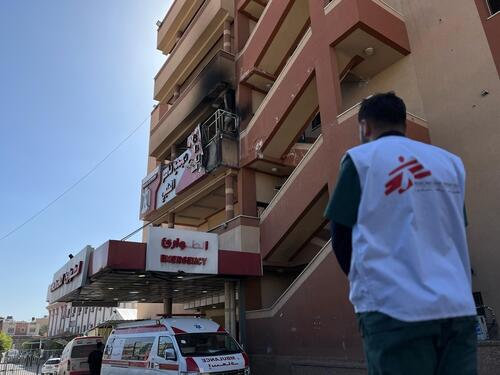One of the world's most common neurological diseases, epilepsy affects nearly 50 million people, but in low-income countries more than 75 per cent of people with epilepsy do not have access to treatment, according to World Health Organization figures. In Liberia, Médecins Sans Frontières (MSF) works in collaboration with five local health facilities to treat more than 1,300 epilepsy patients. Emmanuel Ballah, an MSF mental health and epilepsy treatment supervisor in Monrovia, Liberia, describes the challenges that people with epilepsy face and how MSF is working with families, communities and health facilities to treat these patients.
What are the experiences of people with epilepsy that you see through the course of your work?
Many of the patients that we see have serious problems from neglect and stigma, because people mistakenly believe that epilepsy is a contagious disease. This is especially true for patients who have convulsions throughout the day. Because of the continuous seizures, they are not able to do anything for themselves, they lack self-care, and family members fear them.
For example, a patient has been abandoned by his relatives, is injured because of falling, and no one cares for him because they are afraid of catching his condition. This is something that we continually work on in explaining epilepsy to a person’s family and community members.
Many of the patients that we see have serious problems from neglect and stigma, because people mistakenly believe that epilepsy is a contagious disease.Emmanuel Ballah, MSF mental health and epilepsy treatment supervisor
In late January we had a community awareness event in the West Point township of Monrovia, with more than 50 community leaders, imams, pastors and school principals. Our health volunteers put on a drama to talk about what happens when someone has a seizure and other people are not willing to help them, because they are afraid.
People shared some myths that explain why they are afraid of epilepsy. One person in the community said when a patient has a seizure, their saliva is like a virus. So these are the beliefs people have about epilepsy, which is why people so often keep away from them.
But people appreciate when we have a good discussion in a community, because they are able to understand how people develop epilepsy and how it is not passed from person to person. They learn how is it treated, and how they can encourage people with epilepsy to seek treatment.
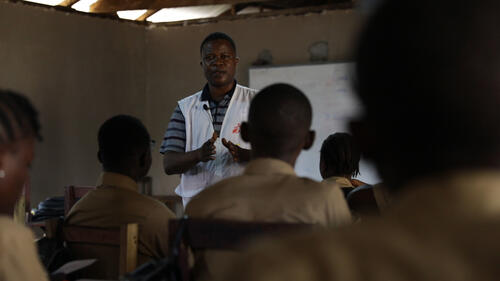
How do you treat epilepsy in Liberia?
As MSF we work with the local health workers in five health facilities in Montserrado County, including in West Point and several other areas of Monrovia. We provide the training, medications and clinical supervision for these health workers to treat patients with epilepsy, as well as patients with mental health disorders.
We also work with teams of psychosocial workers and government community health volunteers to explain epilepsy to a patient's family and community, advocate for their inclusion in school and other normal activities, and help people understand that people with epilepsy are not a danger to other people.
The program started in 2017 and is still growing. We now have more than 1,300 patients receiving care for epilepsy on a regular basis, and most report that their condition and their quality of life have significantly improved.
We explain epilepsy to a patient's family and community, advocate for their inclusion in school and other normal activities.Emmanuel Ballah, MSF mental health and epilepsy treatment supervisor
What medications are used?
In Liberia, health workers often think that when you are epileptic, you can be treated with phenobarbital. However, not everyone is treated successfully with phenobarbital, and there are three other medications that may be used, depending on a patient's condition: phenytoin, sodium valproate and carbamazepine. The problem is that these medications often cannot be found in other health facilities in Liberia.
For example, we have a patient who has to travel from miles away in central Liberia each month to come to our clinic, because they cannot find the carbamazepine that they need. The money they use on transportation to come to us, they could have used to buy the medication, but they cannot find it in their community. That's why even though our idea was initially just to treat patients from Montserrado County, we are seeing people come from almost everywhere in Liberia.
People also go to traditional healers, because of nonmedical explanations of the symptoms they see, such as demon possession. They may take herbs or powders, which are not effective, and which may be harmful. When people start to take medication from a clinic in our programme, they start to get better, and they realise this is better than traditional healing methods.
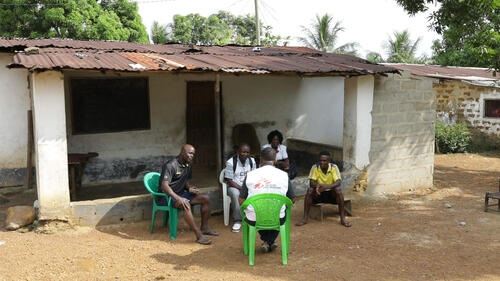
How does treatment affect patients' lives?
People are so appreciative because we evaluate them, give them the right treatment, and now they are seizure-free. We just had one patient who graduated from the University of Liberia who was taking treatment from other places, buying medication from the drug stores, and he kept having seizures. But after we started to treat him, he is seizure-free for two years.
We recently had four children who were expelled from different schools because of the stigma of epilepsy, and we worked with their families and their schools to readmit them. Once they are on treatment, they can go to school.
We had a new patient yesterday who is about 18 years old who has been having seizures five or six times a day, every day, for years. They have been giving him herbs and other things which do not work.
You can see that his social and intellectual development is stunted because he is excluded from everything, but now we are putting him on treatment.
This is the most rewarding part of the work that I do. I see that I have a result, that our patients can become functional, and their lives are restored.



